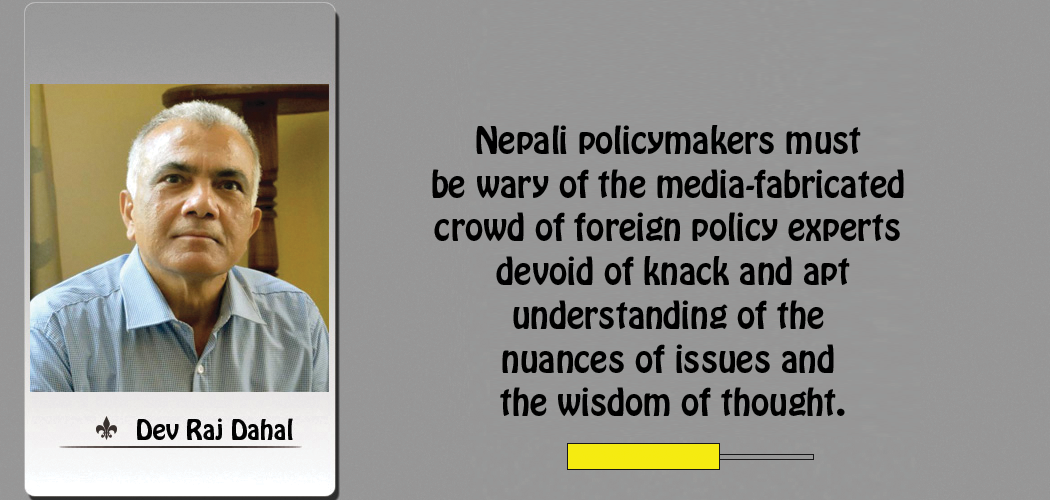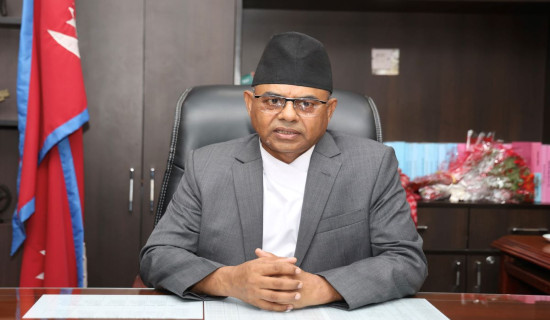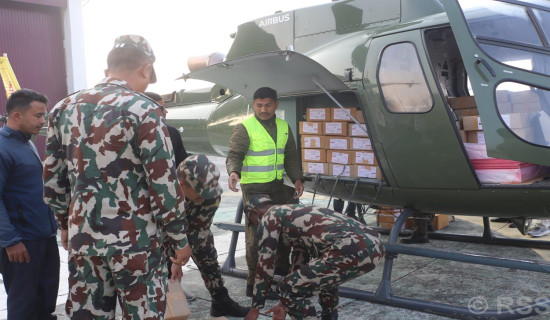- Thursday, 26 February 2026
Ending Ambiguity In Foreign Policy
The thymotic drive of Nepal, a drive for national independence and kernel of its sovereign identity in the world of nations, has given it strong resilience in a disorderly world of dynamic complexity. The paragon of its national pride has separated it from colonial traits of tutelage to any alliance and allowed scope for national-self-determination in the tradition set by Prithvi Narayan Shah and followed by Jung Bahadur Rana, King Mahendra and B.P. Koirala. They represented different points in time but adopted realism in foreign policy by maximising the state power, utilised all the available soft power of the society to defend it, managed the geopolitical spoilers and pursued the strategy of justice, progress and social peace.
Nepal has maintained different web of ties with various scales of powers and adapted to changing geopolitical milieu without captivating its security, survival strategy, development and freedom of manoeuvre even if it faced cascade of problems in the diverse phases of the nation’s tumultuous political history. The nation’s intrinsic ability to alter regional and international milieu is slim. Democratic and constitutional norms of legitimacy, accountability and transparency require cultivating internal social cohesion and external adaptation through proper coordination of various institutions and actors influencing its behaviour. On the contrary, regional and international power centres have used their local proxies to unleash regime-change, social engineering and spiral of institutional atrophy to squeeze payoffs from Nepal and force it to accept buffer status, subordinate position against its will and even ditch imaginative initiative of declaring the nation a zone of peace.
Tectonic shift
The current tectonic shift in the regional and global balance of power with the meteoric ascent of China and countervailing measures by the USA and its allies and India requires Nepal to construct a sound foreign policy template to easily acclimatise to changing external milieu, learn from historical lessons, reflect the aspiration of its people as they are caring more about foreign policy now than any time in the nation’s history and build discursive consensus with the epistemic community on defining its ends and means. It is vital to avoid any ambiguity it faces like its response to the Venezuela crisis.
Any framing of Nepal’s foreign policy in a multi-polar world requires corresponding response to equidistant multi-polarism. It provides a cognitive map to navigate well without being insensitive to the classical geopolitical image of the nation “a yam between two boulders” and realise the constitutional vision of economic independence to guide external self-determination. It does not directly offend several poles of power with status quo and revisionist orientations. No other nation can substitute its relations with India and China. But Nepal must be wary of their common aspiration to subordinate it to their bigemony like in Lipulek and balance with a complex set of other powers like the USA, Europe, Japan and Russia and scores of international regimes built on shared objectives and sovereign equality.
Nepal has historically achieved an independent spirit, defied the lure of outside powers to dominate its domestic and foreign policies and struggled for self-equalising disposition of sovereignty by roving through the flare of idealism of Panchasheel, non-alignment and the principles of the UN coded in international laws. Upholding these values can shore up the morality of mutual recognition and mutual authority. Nepal for long believed that free society does not brutalise small states’ claims to justice and collude to weaken international rights to public goods, recognition and legitimacy.
To shore up the capacity of responsibility to its own people and enhance leverage in international politics it has banded with the groups of small states, non-aligned, landlocked, least developed nations, joined international regimes to exercise multi-lateral diplomacy, hosted institutions of regional and global in reach, engaged in peace keeping to serve people in pain, elevated ties with labour importing nations and participated in international conferences for policy articulation and identity. Nepal does not have a choice to flip from one pole of power to another other than to find equilibrium in the golden mean in domestic politics, regional affairs and international relations.
If the frame of its foreign policy flips to a radical tilt to one camp, it can easily provoke counter pressures entailing instant readjustment. Such a delicate balancing strategy in the past assured its neighbours facing a security dilemma and then super powers containing each other. It had reduced their capacity for unilateral interference in Nepal’s internal affairs. Now, as both the USA and China want to see the world order in their self-image, Russia nostalgic of past glory and India imagining Akhand Bharat, Nepali leaders must control their impulse to power by inviting any external agency for regime survival or change. They must learn from historical wisdom of balancing tact to sail in the irreconcilable complexity of geopolitics.
In this sense, realism and unmaking of ideological affinity of foreign policy like in the fifties, should not be the basis of conduct. It allows Nepal to judge issues without favour or fear. The historical situation of the fifties does not exist now and, therefore, a new structure of strategic thought is needed beyond a tug of war of great powers for regime compatibility. Correctness of foreign policy helps to harness its sovereignty and the reality of Sino-Russian and Indian ascendance dominating the Eurasian heartland and pulling the attention of great powers to the Asianisation of world politics beyond the drape of Atlantic’s stratagem such as Indo-Pacific Strategy and QUAD to entice India to act as a countervailing power to contain, match and push China to its orbit.
On the contrary, China has initiated its own Global Security Initiative and Global Development Initiative to neutralise their offensive in Nepal. The Chinese deep concern for Nepal’s sovereignty, independence and territorial integrity is well pronounced in the same way Nepalis concern for the survival of the nation’s centripetal elements that gave it enduring security, survival and status. The costs of false choice of alignment for Nepal on the basis of ideological affinity when many Asian nations are rediscovering their own philosophical and cultural roots of progress.
Rather than being haunted by the global anarchy and the precarious life for small states, it should secure the nation’s economic lifeline where the nation’s comparative and competitive strength lies and engage people in production revolution so that special interest groups of the state cannot subvert state policies of welfare measures which are crucial to draw the loyalty of people and prevent their whisk from one after another nation for livelihood and opportunity. Nepali scholars are stating and restating an unpleasant concern about the shift from its heroic image of Gorkha to helpless exporter of workers, food surplus and exporter to gross importer, debt-free to debt ridden and sovereign to dependent nation wanting sufficient vision, choice and self-determination in external policy fronts.
Nepal’s pivotal site and its effort to diversify international relations have helped it to reduce risk of vulnerability to one power. But it is caught in the whipsaw of cross-pressure of India, China and the USA for influence where each negates the other and wields influence. Nepal’s aversion to global anarchy requires an integrated and long-term foreign policy strategy destined to reclaim its bridging roles to avert the looming crisis of governance. Any immunity to national sensibilities and equating national consensus to leadership consensus despite its demerit can undermine Nepal’s international creditworthiness. This means primacy of national interests over personal or partisan consideration for short-term power games is incompatible to the worldview of Nepalis and will to shape strategic orientations to multipoles of power.
Unpreparedness can easily rock its institutional mechanism of foreign policy. Nepali leaders’ capacity to raise issues such as publication of a new map adding some territory in Nepal but not pursuing it in negotiation and bargaining to practically gain it is procrastinated. The task is Herculean and requires multi-track diplomacy. Nepali policymakers must be wary of the media-fabricated crowd of foreign policy experts devoid of knack and apt understanding of the nuances of issues and the wisdom of thought. Their half-conscious idea of shifting geopolitics is biased by the partisan view. They seem grossly weak to formulate historical perspectives with copious analogies to learn. In fact, media polemics have turned leadership into cults rewarding the loyalists, not independent organic experts.
Adversarial politics
Loyalty to leaders has outshined the loyalty to party, polity and the state turning many vital issues hot. One can cite examples of citizenship, transitional justice, State Partnership Programme (SPP), Belt and Road Initiative (BRI), water resource use, etc. As a result, in all areas of foreign policy concerns, even law-breakers have been introduced to serve the nation who do not know external powers’ stake in Nepal, lack the insight of multi-stakeholder dynamics played on adversarial politics, emptied of diplomatic skill to foster national interests in a multi-polar world order and suffer from ethics and effectiveness. Only a profound grasp of international relations, historical, aspirational and geostrategic, can rationalise the efficacy of small state diplomacy.
To do so Nepal’s economic policies, driven by inscrutable crunching of data, entails a shift to the life-boat notion of inclusion, equity and sustainability. The linear growth model once ebulliently celebrated to vault its progress, stirred by the ideals of globalisation, knew no laws of the market, did not respect the state’s imperatives, not even adhere to distributive justice affirming the rights of Nepalis articulated in the Constitution. Sustainable production, shored up by the economic foundation of the nation can finance policy wonk enabling it to resolve the ambiguity in its foreign policy.
(Former Reader at the Department of Political Science, TU, Dahal writes on political and social issues.)

















